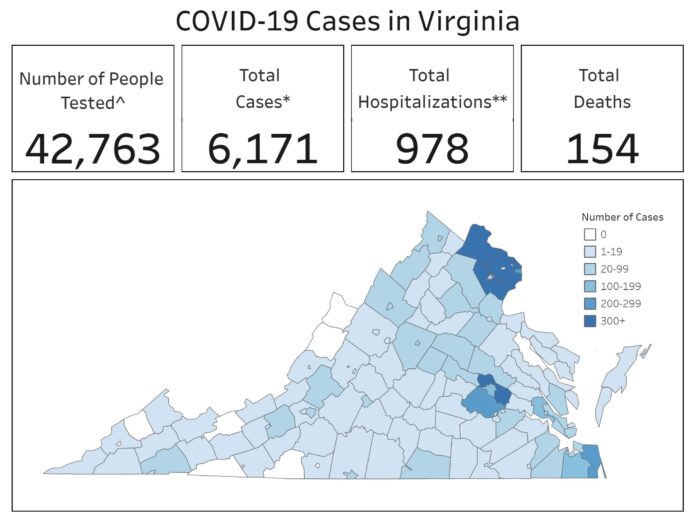Researchers from the University of Virginia’s Biocomplexity Institute and the nonprofit RAND Corporation, released new infectious disease modeling on the impact of COVID-19 mitigations in Virginia.
Current models presented during a briefing held yesterday show that social distancing efforts beginning in mid-March have paused the growth of the COVID-19 epidemic in the Commonwealth. While data and testing remain limited, current trends suggest that Virginia’s statewide hospital bed capacity will be sufficient in the immediate future.
Current social distancing efforts starting March 15 have paused the growth of the epidemic in the Commonwealth of Virginia. In this scenario, “paused” growth means that the rate of new cases is holding steady rather than increasing.
To understand the impact of COVID-19 mitigations in Virginia, the UVA Biocomplexity Institute developed a model of the pandemic that incorporates disease dynamics such as transmissibility and incubation period as well as population density and social behavior. The Institute modeled five potential scenarios, exploring slowing growth vs. pausing growth with social distancing in place until April 30 and June 10 compared to no mitigation.
“Currently, it appears as if the Commonwealth of Virginia is tracking with the pause scenario, which means that the residents of Virginia are doing an excellent job with mitigation,” said Bryan Lewis, Research Associate Professor for the Network Systems Science and Advanced Computing division for the Institute. “Even without perfect projections, we can confidently draw conclusions. We know that social distancing is working and lifting restrictions too early can lead to a second surge. We will continue to improve our models as more data become available. We plan to incorporate outcomes specific by age, integrate the role of seasonality, and analyze mitigation techniques such as a Test-Trace-Isolate approach.”
The UVA Biocomplexity Institute has been on the forefront of epidemic modeling and mitigation since 2002, supporting the U.S. federal government and other countries through several epidemics, including planning for H5N1, the 2009 H1N1 pandemic, the MERS outbreak of 2012, and the Ebola outbreaks of 2014 and 2019. Institute researchers have worked in partnership with U.S. government agencies since early 2020 to inform evidence-based decision making for the COVID-19 pandemic.
“Several groups have produced models to understand how the COVID-19 pandemic might progress and to explore potential policy options,” said Carter Price, a senior mathematician at the RAND Corporation. “Each of these models has strengths and weakness, and they are likely to evolve as more and better data become available. We are helping the leadership of the Commonwealth of Virginia assess the different models so that policy can be made with the best available information.”


